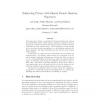Free Online Productivity Tools
i2Speak
i2Symbol
i2OCR
iTex2Img
iWeb2Print
iWeb2Shot
i2Type
iPdf2Split
iPdf2Merge
i2Bopomofo
i2Arabic
i2Style
i2Image
i2PDF
iLatex2Rtf
Sci2ools
SPW
2005
Springer
2005
Springer
Enhancing Privacy with Shared Pseudo Random Sequences
Protecting users’ privacy is essential for turning networks and services into trustworthy friends. Many privacy enhancing techniques, such as anonymous e-cash and mix-nets, have been proposed to make users more comfortable in their network usage. These techniques, in turn, usually rely on very basic security mechanisms, e.g., confidentiality protection, for their realization. But these mechanisms are also used for other security related reasons. In this paper, we make some new observations on how security can degrade privacy. For example, using security as a component of an advanced privacy enhancing technique may not have the effect we expect; i.e., too careless application of security may defeat the assumed privacy gains. In particular, introducing new identifiers may make it easier to track users. This effect is especially harmful to mobile users. Even in cases when privacy is not the main driver for the use of security, we believe that identifiers require special attention ...
Related Content
| Added | 28 Jun 2010 |
| Updated | 28 Jun 2010 |
| Type | Conference |
| Year | 2005 |
| Where | SPW |
| Authors | Jari Arkko, Pekka Nikander, Mats Näslund |
Comments (0)

